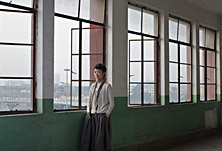
How to gauge the human impact of the gigantic industrial and cultural transformations in China? Recently, in Chengdu, the state owned factory 420 shut down to make way for a luxury apartment complex called "24 City". Three generations, eight characters: old workers, factory executives and yuppies: that is the rather simple set up for the new film by Chinese director Jia Zhang-ke. Starting out as a documentary project, almost 100 interviews were conducted with people in Chengdu. Eventually, the film was re-conceived as a mixture between fiction and documentary, and succeeds in balancing on a delicate line between genres. |
|

Jia, who is known for the documentary quality of his feature films, wanted to make a documentary, but his imagination started running. With highly stylized visuals shot on HD and partly performed by professional actors, the essence of his documentary research is recreated. The austere outcome, including many intense and captivating descriptions by the actors and townspeople, may be one of the most important and emotional Chinese films of recent years. “It is all about the experience of reality and not about showing reality itself...” (Jia Zhang-ke).
The screening of 24 City is linked to the Damien Ounouri documentary about Jia Zhang-ke, Xiao Jia Going Home |
|
Er shi si cheng ji
China/Hong Kong/Japan 2008,
112min. 35mm
Mandarin, Shanghainese. Subtitles: Dutch
Crew
Screenplay: Jia Zhang-ke, Zhai Yongming
Cinematography: Wang Yu, Yu Lik-wai Nelson
Sound: Zhang Yang
Editing: Kong Jing-lei, Lin Xudong
Distribution: Cinéart
Director
Jia Zhang-ke (1970, Fenyang, China) is a Chinese film director who is generally regarded as a leading figure of the Sixth Generation movement of Chinese cinema. Jia's interest in film began in the early 1990s, as an art student at the Shanxi University in Taiyuan. His early films were made underground but in 2004, the Chinese government allowed Jia to direct his fourth feature film (The World) with state approval. |